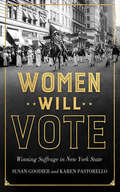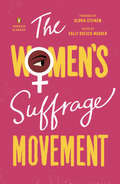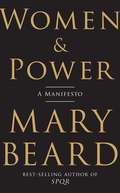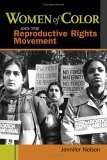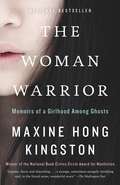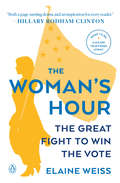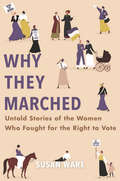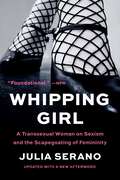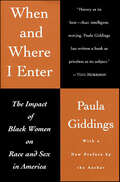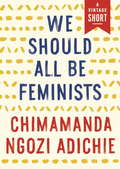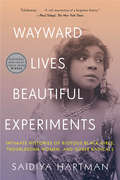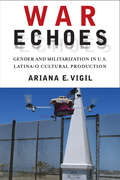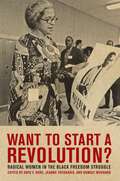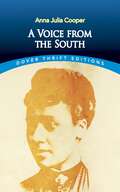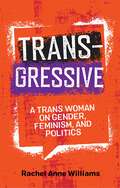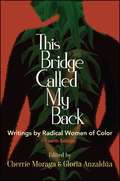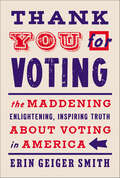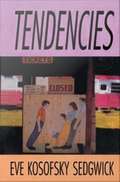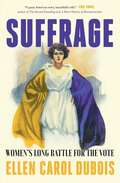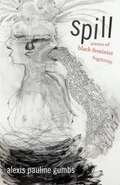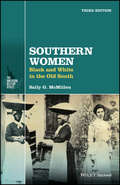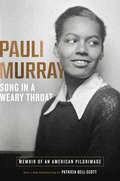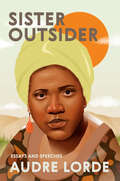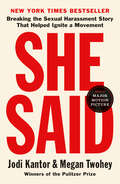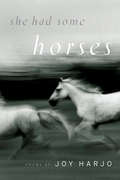Special Collections
NYPL's 2020 Essential Reads on Feminism for Adults
Description: This NYPL list includes first-hand accounts and histories of the suffrage movement that chronicle both its successes and its limitations, as well as contemporary essays on how feminism intersects with race, class, education, and LGBTQ+ activism. #adults
- Table View
- List View
Women Will Vote
by Karen Pastorello and Susan GoodierWomen Will Vote celebrates the 2017 centenary of women’s right to full suffrage in New York State. Susan Goodier and Karen Pastorello highlight the activism of rural, urban, African American, Jewish, immigrant, and European American women, as well as male suffragists, both upstate and downstate, that led to the positive outcome of the 1917 referendum. Goodier and Pastorello argue that the popular nature of the women’s suffrage movement in New York State and the resounding success of the referendum at the polls relaunched suffrage as a national issue. If women had failed to gain the vote in New York, Goodier and Pastorello claim, there is good reason to believe that the passage and ratification of the Nineteenth Amendment would have been delayed. Women Will Vote makes clear how actions of New York’s patchwork of suffrage advocates heralded a gigantic political, social, and legal shift in the United States. Readers will discover that although these groups did not always collaborate, by working in their own ways toward the goal of enfranchising women they essentially formed a coalition. Together, they created a diverse social and political movement that did not rely solely on the motivating force of white elites and a leadership based in New York City. Goodier and Pastorello convincingly argue that the agitation and organization that led to New York women’s victory in 1917 changed the course of American history.
The Women's Suffrage Movement
by Gloria Steinem and Sally Roesch WagnerAn intersectional anthology of works by the known and unknown women that shaped and established the suffrage movement, in time for the 2020 centennial of women's right to vote, with a foreword by Gloria Steinem
Comprised of historical texts spanning two centuries, The Women's Suffrage Movement is a comprehensive and singular volume that covers the major issues and figures involved in the movement, with a distinctive focus on diversity, incorporating race, class, and gender, and illuminating minority voices. In an effort to spotlight the many influential voices that were excluded from the movement, the writings of well-known suffragists such as Elizabeth Cady Stanton and Susan B. Anthony are featured alongside accounts of Native American women who inspired suffragists like Matilda Joslyn Gage to join the movement, as well as African American suffragists such as Sarah Mapps Douglas and Harriet Purvis, who were often left out of the conversation because of their race.
The editor and introducer, Sally Roesch Wagner, is a pre-eminent scholar of the diverse backbone of the women's suffrage movement, the founding director of the Matilda Joslyn Gage Foundation, and serves on the New York State Women's Suffrage Commission.
Women & Power
by Mary BeardA NEW YORK TIMES BESTSELLER "A modern feminist classic."—The Guardian
From the internationally acclaimed classicist and New York Times best-selling author comes this timely manifesto on women and power.
At long last, Mary Beard addresses in one brave book the misogynists and trolls who mercilessly attack and demean women the world over, including, very often, Mary herself. In Women & Power, she traces the origins of this misogyny to its ancient roots, examining the pitfalls of gender and the ways that history has mistreated strong women since time immemorial. As far back as Homer’s Odyssey, Beard shows, women have been prohibited from leadership roles in civic life, public speech being defined as inherently male. From Medusa to Philomela (whose tongue was cut out), from Hillary Clinton to Elizabeth Warren (who was told to sit down), Beard draws illuminating parallels between our cultural assumptions about women’s relationship to power—and how powerful women provide a necessary example for all women who must resist being vacuumed into a male template. With personal reflections on her own online experiences with sexism, Beard asks: If women aren’t perceived to be within the structure of power, isn’t it power itself we need to redefine? And how many more centuries should we be expected to wait?
Women of Color and the Reproductive Rights Movement
by Jennifer NelsonWomen of Color and the Reproductive Rights Movement reveals how Black and Puerto Rican Nationalists reshaped the women&’s liberation crusade. While most people believe that the movement to secure voluntary reproductive control for women centered solely on abortion rights, for many women abortion was not the only, or even primary, focus. Jennifer Nelson tells the story of the feminist struggle for legal abortion and reproductive rights in the 1960s, 1970s, and early 1980s through the particular contributions of women of color. She explores the relationship between second-wave feminists, who were concerned with a woman's right to choose, Black and Puerto Rican Nationalists, who were concerned that Black and Puerto Rican women have as many children as possible &“for the revolution,&” and women of color themselves, who negotiated between them. Contrary to popular belief, Nelson shows that women of color were able to successfully remake the mainstream women's liberation and abortion rights movements by appropriating select aspects of Black Nationalist politics—including addressing sterilization abuse, access to affordable childcare and healthcare, and ways to raise children out of poverty—for feminist discourse. &“Jennifer Nelson has expertly reconstructed a crucial period, just before and after Roe v. Wade, when the activist agendas of women of color reshaped the content and the goals of reproductive politics in the United States. Nelson understands—and makes an excellent case for—the proposition that a meaningful history of U.S. reproductive politics must be profoundly inflected by attention to race and class.&” —Rickie Solinger, author of Beggars and Choosers: How the Politics of Choice Shapes Adoption, Abortion, and Welfare in the U.S.
The Woman Warrior
by Maxine Hong KingstonNATIONAL BESTSELLER • An exhilarating blend of autobiography and mythology, of world and self, of hot rage and cool analysis. First published in 1976, it has become a classic in its innovative portrayal of multiple and intersecting identities—immigrant, female, Chinese, American. • NATIONAL BOOK CRITICS CIRCLE AWARD WINNER &“A classic, for a reason.&” —Celeste Ng, bestselling author of Little Fires Everywhere and Our Missing Hearts, via TwitterAs a girl, Kingston lives in two confounding worlds: the California to which her parents have immigrated and the China of her mother&’s &“talk stories.&” The fierce and wily women warriors of her mother&’s tales clash jarringly with the harsh reality of female oppression out of which they come. Kingston&’s sense of self emerges in the mystifying gaps in these stories, which she learns to fill with stories of her own. A warrior of words, she forges fractured myths and memories into an incandescent whole, achieving a new understanding of her family&’s past and her own present.
The Woman's Hour
by Elaine WeissThe nail-biting climax of one of the greatest political battles in American history: the ratification of the constitutional amendment that granted women the right to vote.
Nashville, August 1920. Thirty-five states have ratified the Nineteenth Amendment, twelve have rejected or refused to vote, and one last state is needed. It all comes down to Tennessee, the moment of truth for the suffragists, after a seven-decade crusade.
The opposing forces include politicians with careers at stake, liquor companies, railroad magnates, and a lot of racists who don't want black women voting.
And then there are the "Antis"--women who oppose their own enfranchisement, fearing suffrage will bring about the moral collapse of the nation.
They all converge in a boiling hot summer for a vicious face-off replete with dirty tricks, betrayals and bribes, bigotry, Jack Daniel's, and the Bible.
Following a handful of remarkable women who led their respective forces into battle, along with appearances by Woodrow Wilson, Warren Harding, Frederick Douglass, and Eleanor Roosevelt, The Woman's Hour is an inspiring story of activists winning their own freedom in one of the last campaigns forged in the shadow of the Civil War, and the beginning of the great twentieth-century battles for civil rights.
Why They Marched
by Susan WareLooking beyond the national leadership of the suffrage movement, Susan Ware tells the inspiring story of nineteen dedicated women who carried the banner for the vote into communities across the nation, out of the spotlight, protesting, petitioning, and demonstrating for women’s right to become full citizens.
Whipping Girl
by Julia SeranoThis classic manifesto is &“a foundational text for anyone hoping to understand transgender politics and culture in the U.S. today.&” (NPR)*Named as one of 100 Best Non-Fiction Books of All Time by Ms. Magazine* In Whipping Girl, biologist and trans activist Julia Serano shares her experiences and insights—both pre- and post-transition—to reveal the ways in which fear, suspicion, and dismissiveness toward femininity shape our attitudes toward trans women, as well as gender and sexuality as a whole. Serano's well-honed arguments and pioneering advocacy stem from her ability to bridge the gap between the often-disparate biological and social perspectives on gender. In this provocative manifesto, she exposes how deep-rooted the cultural belief is that femininity is frivolous, weak, and passive. In addition to debunking popular misconceptions about being transgender, Serano makes the case that today's feminists and transgender activists must work to embrace and empower femininity—in all of its wondrous forms.
When and Where I Enter
by Paula J. GiddingsA history of the African American woman’s experience in America and an analysis of the relationship between sexism and racism.When and Where I Enter is an eloquent testimonial to the profound influences of African American women on race and women’s movements throughout American history. Drawing on speeches, diaries, letters, and other original documents, Paula Giddings powerfully portrays how black women have transcended racist and sexist attitudes—often confronting white feminists and black male leaders alike—to initiate social and political reform. From the open disregard for the rights of slave women to examples of today’s more covert racism and sexism in civil rights and women’s organizations, Giddings illuminates the black woman’s crusade for equality in the process, she paints unforgettable portraits of black female leaders, such as antilynching activist Ida B. Wells, educator and FDR adviser Mary McCleod Bethune, and the heroic civil rights leader Fannie Lou Hamer, among others, who fought both overt and institutionalized oppression.Praise for When and Where I Enter“History at its best—clear, intelligent, moving. Paula Giddings has written a book as priceless as its subject.” —Toni Morrison“A powerful book. Paula Giddings has shone a brilliant light on the lives of women left in the shadow of history.” —Maya Angelou“A jarringly fresh interpretation . . . a labor of commitment and love.” —New York Times Book Review
We Should All Be Feminists
by Chimamanda Ngozi AdichieAn eBook short.What does "feminism" mean today? That is the question at the heart of We Should All Be Feminists, a personal, eloquently-argued essay--adapted from her much-viewed Tedx talk of the same name--by Chimamanda Ngozi Adichie, the award-winning author of Americanah and Half of a Yellow Sun. With humor and levity, here Adichie offers readers a unique definition of feminism for the twenty-first century--one rooted in inclusion and awareness. She shines a light not only on blatant discrimination, but also the more insidious, institutional behaviors that marginalize women around the world, in order to help readers of all walks of life better understand the often masked realities of sexual politics. Throughout, she draws extensively on her own experiences--in the U.S., in her native Nigeria, and abroad--offering an artfully nuanced explanation of why the gender divide is harmful for women and men, alike. Argued in the same observant, witty and clever prose that has made Adichie a bestselling novelist, here is one remarkable author's exploration of what it means to be a woman today--and an of-the-moment rallying cry for why we should all be feminists.
Wayward Lives, Beautiful Experiments
by Saidiya HartmanWinner of the 2019 National Book Critics Circle Award in Criticism Winner of the PEN/John Kenneth Galbraith Award for Nonfiction Winner of the 2020 Judy Grahn Award for Lesbian Nonfiction Finalist for the Lambda Literary Award for Lesbian Memoir/Biography "Exhilarating…A rich resurrection of a forgotten history." —Parul Sehgal, New York Times Beautifully written and deeply researched, Wayward Lives, Beautiful Experiments examines the revolution of black intimate life that unfolded in Philadelphia and New York at the beginning of the twentieth century. In wrestling with the question of what a free life is, many young black women created forms of intimacy and kinship indifferent to the dictates of respectability and outside the bounds of law. They cleaved to and cast off lovers, exchanged sex to subsist, and revised the meaning of marriage. Longing and desire fueled their experiments in how to live. They refused to labor like slaves or to accept degrading conditions of work. Here, for the first time, these women are credited with shaping a cultural movement that transformed the urban landscape. Through a melding of history and literary imagination, Wayward Lives, Beautiful Experiments recovers these women’s radical aspirations and insurgent desires.
War Echoes
by Ariana E. VigilWar Echoes examines how Latina/o cultural production has engaged with U.S. militarism in the post-Viet Nam era. Analyzing literature alongside film, memoir, and activism, Ariana E. Vigil highlights the productive interplay among social, political, and cultural movements while exploring Latina/o responses to U.S. intervention in Central America and the Middle East. These responses evolved over the course of the late twentieth and early twenty-first centuries--from support for anti-imperial war, as seen in Alejandro Murguia's Southern Front, to the disavowal of all war articulated in works such as Demetria Martinez's Mother Tongue and Camilo Mejia's Road from Ar Ramadi.
With a focus on how issues of race, class, gender, and sexuality intersect and are impacted by war and militarization, War Echoes illustrates how this country's bellicose foreign policies have played an integral part in shaping U.S. Latina/o culture and identity and given rise to the creation of works that recognize how militarized violence and values, such as patriarchy, hierarchy, and obedience, are both enacted in domestic spheres and propagated abroad.
Want to Start a Revolution?
by Jeanne Theoharis and Komozi Woodard and Dayo F. GoreUncovers the often overlooked stories of the women who shaped the black freedom struggleThe story of the black freedom struggle in America has been overwhelmingly male-centric, starring leaders like Martin Luther King, Jr., Malcolm X, and Huey Newton. With few exceptions, black women have been perceived as supporting actresses; as behind-the-scenes or peripheral activists, or rank and file party members. But what about Vicki Garvin, a Brooklyn-born activist who became a leader of the National Negro Labor Council and guide to Malcolm X on his travels through Africa? What about Shirley Chisholm, the first black Congresswoman?From Rosa Parks and Esther Cooper Jackson, to Shirley Graham DuBois and Assata Shakur, a host of women demonstrated a lifelong commitment to radical change, embracing multiple roles to sustain the movement, founding numerous groups and mentoring younger activists. Helping to create the groundwork and continuity for the movement by operating as local organizers, international mobilizers, and charismatic leaders, the stories of the women profiled in Want to Start a Revolution? help shatter the pervasive and imbalanced image of women on the sidelines of the black freedom struggle.Contributors: Margo Natalie Crawford, Prudence Cumberbatch, Johanna Fernández, Diane C. Fujino, Dayo F. Gore, Joshua Guild, Gerald Horne, Ericka Huggins, Angela D. LeBlanc-Ernest, Joy James, Erik McDuffie, Premilla Nadasen, Sherie M. Randolph, James Smethurst, Margaret Stevens, and Jeanne Theoharis.
A Voice from the South
by Janet Neary and Anna Julia CooperA cornerstone of black feminist and political theory, this collection of essays focuses on racial progress and women's rights. A Voice from the South, written in 1892, is regarded as the first statement of black feminism. Despite their imprint of nineteenth-century social thought, these essays possess an urgent, modern tone, characterized by an emphasis on debate and a scintillating wit. Topics include the importance of women's education as well as African Americans' economic roles and their literary representation.A noted member of Washington, D. C.'s African American community, Anna Julia Cooper (1858 - 1964) rose to prominence as a leading scholar, educator, and activist at the end of the nineteenth century. Born into slavery, she was the fourth African American woman to earn a doctoral degree, receiving a PhD in history from the University of Paris-Sorbonne in 1924. This edition includes an informative Introduction to Cooper's life and work by Janet Neary.
Transgressive
by Rachel Anne WilliamsHow do I know I am trans? Is trans feminism real feminism? What is there to say about trans women's male privilege? This collection of insightful, pithy and passionately argued think pieces from a trans-feminist perspective explores issues surrounding gender, feminism and philosophy and challenges misconceptions about trans identities. The book confronts contentious debates in gender studies to alleviate ongoing tension between feminism and trans women. Split into six sections, this collection covers wider issues, as well as autobiographical experiences, designed to stimulate the reader and encourage them to actively participate.
This Bridge Called My Back
by Gloria Anzaldúa and Cherríe MoragaOriginally released in 1981, This Bridge Called My Back is a testimony to women of color feminism as it emerged in the last quarter of the twentieth century. Through personal essays, criticism, interviews, testimonials, poetry, and visual art, the collection explores, as coeditor Cherríe Moraga writes, “the complex confluence of identities—race, class, gender, and sexuality—systemic to women of color oppression and liberation.”
Reissued here, nearly thirty-five years after its inception, the fourth edition contains an extensive new introduction by Moraga, along with a previously unpublished statement by Gloria Anzaldúa. The new edition also includes visual artists whose work was produced during the same period as Bridge, including Betye Saar, Ana Mendieta, and Yolanda López, as well as current contributor biographies. Bridge continues to reflect an evolving definition of feminism, one that can effectively adapt to, and help inform an understanding of the changing economic and social conditions of women of color in the United States and throughout the world.
Thank You for Voting
by Erin Geiger SmithIn this concise, lively look at the past, present, and future of voting, a journalist examines the long and continuing fight for voting equality, why so few Americans today vote, and innovative ways to educate and motivate them; included are checklists of what to do before election day to prepare to vote and encourage others.Voting is a prized American right and a topic of debate from the earliest days of the country. Yet in the 2016 presidential election, about 40 percent of Americans—and half of the country’s young adults—didn’t vote. Why do so many Americans choose not to vote, and what can we do about it? The problem, Erin Geiger Smith contends, is a lack of understanding about our electoral system and a need to make voting more accessible. Thank You for Voting is her eye-opening look at the voting process, starting with the Framers’ perspective, through the Equal Protection amendment and the Voting Rights Act, to the present and simple actions individuals can take to increase civic participation in local, state, and national elections.Geiger Smith expands our knowledge about our democracy—including women’s long fight to win the vote, attempts to suppress newly enfranchised voters' impact, state prohibitions against felons voting, charges of voter fraud and voter suppression, and other vital issues. In a conversational tone, she explains topics that can confuse even the most informed voters: polling, news literacy, gerrymandering and the Electoral College. She also explores how age, race, and socioeconomic factors influence turnout.Ultimately, Thank You for Voting offers hope. Geiger Smith challenges corporations to promote voting, and offers examples of how companies like Patagonia and Walmart have taken up the task in a non-partisan way. And she reveals how get-out-the-vote movements—such as television star Yara Shahidi’s voting organization, Michelle Obama’s When We All Vote campaign, and on-the-ground young activists—innovatively use technology and grassroots techniques to energize first-time voters.
Tendencies
by Eve Kosofsky SedgwickTendencies brings together for the first time the essays that have made Eve Kosofsky Sedgwick "the soft-spoken queen of gay studies" (Rolling Stone). Combining poetry, wit, polemic, and dazzling scholarship with memorial and autobiography, these essays have set new standards of passion and truthfulness for current theoretical writing. The essays range from Diderot, Oscar Wilde, and Henry James to queer kids and twelve-step programs; from "Jane Austen and the Masturbating Girl" to a performance piece on Divine written with Michael Moon; from political correctness and the poetics of spanking to the experience of breast cancer in a world ravaged and reshaped by AIDS. What unites Tendencies is a vision of a new queer politics and thought that, however demanding and dangerous, can also be intent, inclusive, writerly, physical, and sometimes giddily fun.
Suffrage
by Ellen Carol DuBoisHonoring the 100th anniversary of the 19th amendment to the Constitution, this &“indispensable&” book (Ellen Chesler, Ms. magazine) explores the full scope of the movement to win the vote for women through portraits of its bold leaders and devoted activists.Distinguished historian Ellen Carol DuBois begins in the pre-Civil War years with foremothers Lucretia Mott, Elizabeth Cady Stanton, Susan B. Anthony, and Sojurner Truth as she &“meticulously and vibrantly chronicles&” (Booklist) the links of the woman suffrage movement to the abolition of slavery. After the Civil War, Congress granted freed African American men the right to vote but not white and African American women, a crushing disappointment. DuBois shows how suffrage leaders persevered through the Jim Crow years into the reform era of Progressivism. She introduces new champions Carrie Chapman Catt and Alice Paul, who brought the fight to the 20th century, and she shows how African American women, led by Ida B. Wells-Barnett, demanded voting rights even as white suffragists ignored them. DuBois explains how suffragists built a determined coalition of moderate lobbyists and radical demonstrators in forging a strategy of winning voting rights in crucial states to set the stage for securing suffrage for all American women in the Constitution. In vivid prose, DuBois describes suffragists&’ final victories in Congress and state legislatures, culminating in the last, most difficult ratification, in Tennessee. &“Ellen DuBois enables us to appreciate the drama of the long battle for women&’s suffrage and the heroism of many of its advocates&” (Eric Foner, author of The Second Founding: How the Civil War and Reconstruction Remade the Constitution). DuBois follows women&’s efforts to use their voting rights to win political office, increase their voting strength, and pass laws banning child labor, ensuring maternal health, and securing greater equality for women. Suffrage: Women&’s Long Battle for the Vote is a &“comprehensive history that deftly tackles intricate political complexities and conflicts and still somehow read with nail-biting suspense,&” (The Guardian) and is sure to become the authoritative account of one of the great episodes in the history of American democracy.
Spill
by Alexis Pauline GumbsIn Spill, self-described queer Black troublemaker and Black feminist love evangelist Alexis Pauline Gumbs presents a commanding collection of scenes depicting fugitive Black women and girls seeking freedom from gendered violence and racism. In this poetic work inspired by Hortense Spillers, Gumbs offers an alternative approach to Black feminist literary criticism, historiography, and the interactive practice of relating to the words of Black feminist thinkers. Gumbs not only speaks to the spiritual, bodily, and otherworldly experience of Black women but also allows readers to imagine new possibilities for poetry as a portal for understanding and deepening feminist theory.
Southern Women
by Sally G. McMillenThe third edition of Southern Women relays the historical narrative of both black and white women in the patriarchal South. Covering primarily the years between 1800 and 1865, it shows the strengths and varied experiences of these women—on plantations, small farms, in towns and cities, in the Deep South, the Upper South, and the mountain South. It offers fascinating information on family life, sexuality, and marriage; reproduction and childrearing; education and religion; women and work; and southern women and the Confederacy.
Southern Women: Black and White in the Old South, Third Edition distills and incorporates recent scholarship by historians. It presents a well-written, more complicated, multi-layered picture of Southern women’s lives than has ever been written about before—thanks to its treatment of current, relevant historiographical debates. The book also: Includes new scholarship published since the second edition appeared Pays more attention to women in the Deep South, especially the experiences of those living in Louisiana and Mississippi Is part of the highly successful American History Series The third edition of Southern Women: Black and White in the Old South will serve as a welcome supplementary text in college or community-college-level survey courses in U.S., Women’s, African-American, or Southern history. It will also be useful as a reference for graduate seminars or colloquia.
Song in a Weary Throat
by Patricia Bell-Scott and Pauli MurrayA prophetic memoir by the activist who “articulated the intellectual foundations” (The New Yorker) of the civil rights and women’s rights movements.
First published posthumously in 1987, Pauli Murray’s Song in a Weary Throat was critically lauded, winning the Robert F. Kennedy Book Award and the Lillian Smith Book Award among other distinctions. Yet Murray’s name and extraordinary influence receded from view in the intervening years; now they are once again entering the public discourse. At last, with the republication of this “beautifully crafted” memoir, Song in a Weary Throat takes its rightful place among the great civil rights autobiographies of the twentieth century. In a voice that is energetic, wry, and direct, Murray tells of a childhood dramatically altered by the sudden loss of her spirited, hard-working parents. Orphaned at age four, she was sent from Baltimore to segregated Durham, North Carolina, to live with her unflappable Aunt Pauline, who, while strict, was liberal-minded in accepting the tomboy Pauli as “my little boy-girl.” In fact, throughout her life, Murray would struggle with feelings of sexual “in-betweenness”—she tried unsuccessfully to get her doctors to give her testosterone—that today we would recognize as a transgendered identity.
We then follow Murray north at the age of seventeen to New York City’s Hunter College, to her embrace of Gandhi’s Satyagraha—nonviolent resistance—and south again, where she experienced Jim Crow firsthand. An early Freedom Rider, she was arrested in 1940, fifteen years before Rosa Parks’ disobedience, for sitting in the whites-only section of a Virginia bus. Murray’s activism led to relationships with Thurgood Marshall and Eleanor Roosevelt—who respectfully referred to Murray as a “firebrand”—and propelled her to a Howard University law degree and a lifelong fight against "Jane Crow" sexism. We also read Betty Friedan’s enthusiastic response to Murray’s call for an NAACP for Women—the origins of NOW. Murray sets these thrilling high-water marks against the backdrop of uncertain finances, chronic fatigue, and tragic losses both private and public, as Patricia Bell-Scott’s engaging introduction brings to life.
Now, more than thirty years after her death in 1985, Murray—poet, memoirist, lawyer, activist, and Episcopal priest—gains long-deserved recognition through a rediscovered memoir that serves as a “powerful witness” (Brittney Cooper) to a pivotal era in the American twentieth century.
Sister Outsider
by Audre Lorde and Cheryl ClarkePresenting the essential writings of black lesbian poet and feminist writer Audre Lorde, SISTER OUTSIDER celebrates an influential voice in twentieth-century literature. In this charged collection of fifteen essays and speeches, Lorde takes on sexism, racism, ageism, homophobia, and class, and propounds social difference as a vehicle for action and change. Her prose is incisive, unflinching, and lyrical, reflecting struggle but ultimately offering messages of hope. This commemorative edition includes a new foreword by Lorde scholar and poet Cheryl Clarke, who celebrates the ways in which Lorde's philosophies resonate more than twenty years after they were first published. These landmark writings are, in Lorde's own words, a call to "never close our eyes to the terror, to the chaos which is Black which is creative which is female which is dark which is rejected which is messy which is. ..."
Reviews: "...it's been almost a quarter of a century since Audre Lorde's essays and speeches in Sister Outsider made an indelible mark on 20th-century literature. But the words of the black lesbian feminist poet seem as lyrical and unforgettable, and, sadly, as relevant today as when she first tackled everything from racism and homophobia to ageism and class dichotomies. A must-have book that every lesbian should read."--Curve Editor's Pick. "Lorde was a brilliant feminist poet and intellectual whose theories on the power of embracing our internal contradictions as well as the differences between people and groups is the way to powerful coalition building and social progress." --New York Post, Sunday. "Poet and librarian Lorde collected 15 of her finest essays and speeches in this 1984 volume. With her poet's command of language, she addresses sexism, racism, black women, black lesbians, eroticism, and more. Still powerful."--Library Journal, Starred Review. "Audre Lorde is a passionate sage. I say 'is' and not 'was' because her keen insights continue to provoke and sustain us and give us courage. The reissue of this book is a gift to longtime admirers and to new readers who have yet to discover the power and grace and splendid audacity of Audre Lorde."--Valerie Miner, author of After Eden and professor of feminist studies at Stanford University. "[Lorde's] works will be important to those truly interested in growing up sensitive, intelligent, and aware."--New York Times.
She Said
by Jodi Kantor and Megan TwoheyFrom the Pulitzer Prize-winning reporters who broke the news of Harvey Weinstein's sexual harassment and abuse for the New York Times, Jodi Kantor and Megan Twohey, the thrilling untold story of their investigation and its consequences for the #MeToo movement
For many years, reporters had tried to get to the truth about Harvey Weinstein’s treatment of women. Rumors of wrongdoing had long circulated. But in 2017, when Jodi Kantor and Megan Twohey began their investigation into the prominent Hollywood producer for the New York Times, his name was still synonymous with power.
During months of confidential interviews with top actresses, former Weinstein employees, and other sources, many disturbing and long-buried allegations were unearthed, and a web of onerous secret payouts and nondisclosure agreements was revealed. These shadowy settlements had long been used to hide sexual harassment and abuse, but with a breakthrough reporting technique Kantor and Twohey helped to expose it.
But Weinstein had evaded scrutiny in the past, and he was not going down without a fight; he employed a team of high-profile lawyers, private investigators, and other allies to thwart the investigation. When Kantor and Twohey were finally able to convince some sources to go on the record, a dramatic final showdown between Weinstein and the New York Times was set in motion.
Nothing could have prepared Kantor and Twohey for what followed the publication of their initial Weinstein story on October 5, 2017. Within days, a veritable Pandora’s box of sexual harassment and abuse was opened. Women all over the world came forward with their own traumatic stories. Over the next twelve months, hundreds of men from every walk of life and industry were outed following allegations of wrongdoing. But did too much change—or not enough?
Those questions hung in the air months later as Brett Kavanaugh was nominated to the Supreme Court, and Christine Blasey Ford came forward to testify that he had assaulted her decades earlier. Kantor and Twohey, who had unique access to Ford and her team, bring to light the odyssey that led her to come forward, the overwhelming forces that came to bear on her, and what happened after she shared her allegation with the world.
In the tradition of great investigative journalism, She Said tells a thrilling story about the power of truth, with shocking new information from hidden sources. Kantor and Twohey describe not only the consequences of their reporting for the #MeToo movement, but the inspiring and affecting journeys of the women who spoke up—for the sake of other women, for future generations, and for themselves.
A New York Times Bestseller
She Had Some Horses
by Joy HarjoA new edition of the beloved volume by Joy Harjo, one of our foremost Native American poets. First published in 1983 and now considered a classic, She Had Some Horses is a powerful exploration of womanhood's most intimate moments. Joy Harjo's poems speak of women's despair, of their imprisonment and ruin at the hands of men and society, but also of their awakenings, power, and love.
